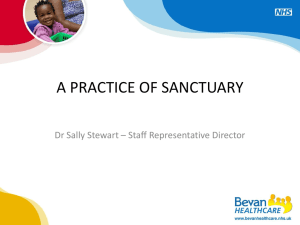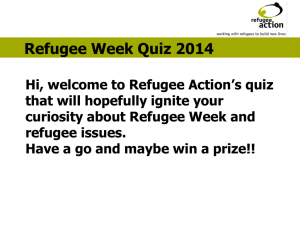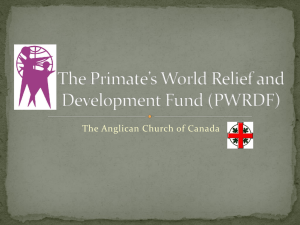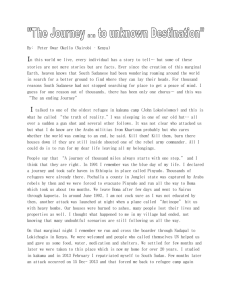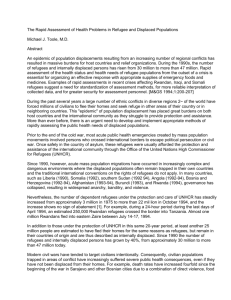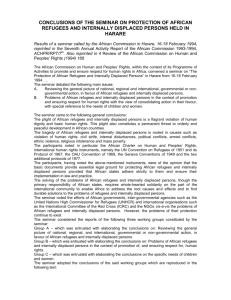Humanitarian Response Program Profile
advertisement
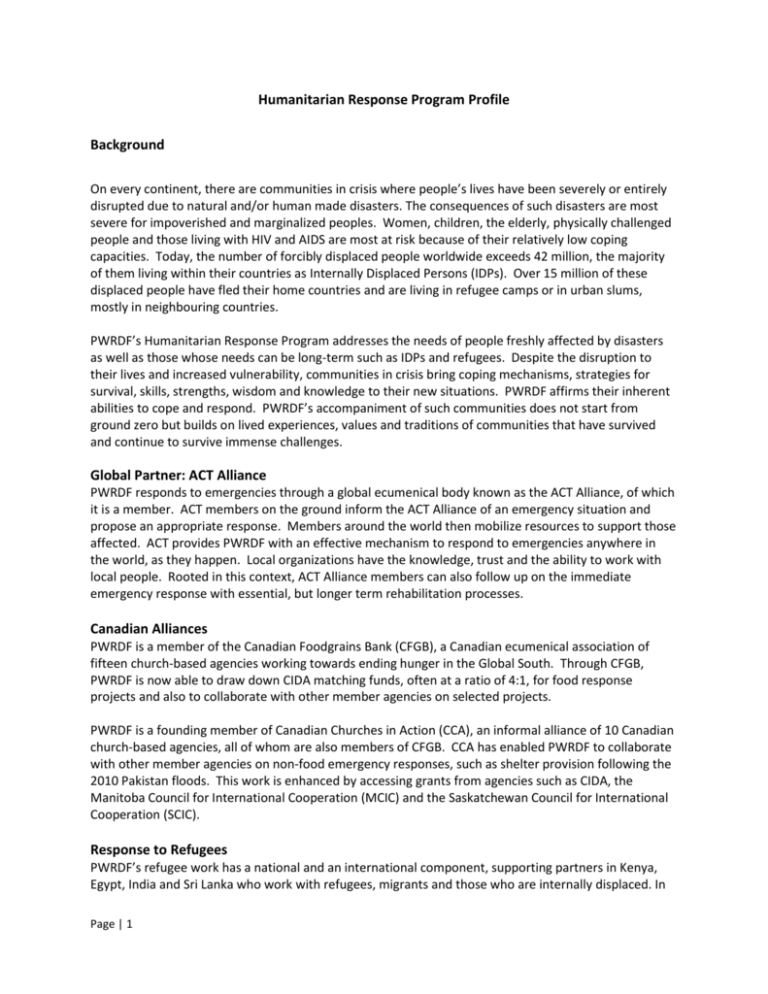
Humanitarian Response Program Profile Background On every continent, there are communities in crisis where people’s lives have been severely or entirely disrupted due to natural and/or human made disasters. The consequences of such disasters are most severe for impoverished and marginalized peoples. Women, children, the elderly, physically challenged people and those living with HIV and AIDS are most at risk because of their relatively low coping capacities. Today, the number of forcibly displaced people worldwide exceeds 42 million, the majority of them living within their countries as Internally Displaced Persons (IDPs). Over 15 million of these displaced people have fled their home countries and are living in refugee camps or in urban slums, mostly in neighbouring countries. PWRDF’s Humanitarian Response Program addresses the needs of people freshly affected by disasters as well as those whose needs can be long-term such as IDPs and refugees. Despite the disruption to their lives and increased vulnerability, communities in crisis bring coping mechanisms, strategies for survival, skills, strengths, wisdom and knowledge to their new situations. PWRDF affirms their inherent abilities to cope and respond. PWRDF’s accompaniment of such communities does not start from ground zero but builds on lived experiences, values and traditions of communities that have survived and continue to survive immense challenges. Global Partner: ACT Alliance PWRDF responds to emergencies through a global ecumenical body known as the ACT Alliance, of which it is a member. ACT members on the ground inform the ACT Alliance of an emergency situation and propose an appropriate response. Members around the world then mobilize resources to support those affected. ACT provides PWRDF with an effective mechanism to respond to emergencies anywhere in the world, as they happen. Local organizations have the knowledge, trust and the ability to work with local people. Rooted in this context, ACT Alliance members can also follow up on the immediate emergency response with essential, but longer term rehabilitation processes. Canadian Alliances PWRDF is a member of the Canadian Foodgrains Bank (CFGB), a Canadian ecumenical association of fifteen church-based agencies working towards ending hunger in the Global South. Through CFGB, PWRDF is now able to draw down CIDA matching funds, often at a ratio of 4:1, for food response projects and also to collaborate with other member agencies on selected projects. PWRDF is a founding member of Canadian Churches in Action (CCA), an informal alliance of 10 Canadian church-based agencies, all of whom are also members of CFGB. CCA has enabled PWRDF to collaborate with other member agencies on non-food emergency responses, such as shelter provision following the 2010 Pakistan floods. This work is enhanced by accessing grants from agencies such as CIDA, the Manitoba Council for International Cooperation (MCIC) and the Saskatchewan Council for International Cooperation (SCIC). Response to Refugees PWRDF’s refugee work has a national and an international component, supporting partners in Kenya, Egypt, India and Sri Lanka who work with refugees, migrants and those who are internally displaced. In Page | 1 Canada, PWRDF works with ecumenical and secular partners in developing policy and advocating for just and fair immigration law and practice. PWRDF also supports the refugee ministry of Anglican dioceses that includes the sponsorship of refugees by dioceses and parishes that have signed a refugee sponsorship agreement with the Government of Canada. PWRDF Partner Profile The National Council of Churches of Kenya (NCCK) works with refugees in Kenya in refugee camps and urban centres. Kakuma Refugee Camp is one of the country’s largest with an estimated population of 100,000, the majority of whom are from Somalia, Sudan and the Democratic Republic of the Congo (DRC). NCCK programs focus on youth, the majority of whom are in the Kakuma camp, sex trade workers, refugees from host communities, and vulnerable urban refugees. The program includes information and awareness building, including prevention of HIV and AIDS, livelihoods skills and income generation training and support for commercial sex workers who are prepared to leave the sex trade. PWRDF has also worked with NCCK to provide durable shelter to the most vulnerable members of the refugee and host communities. Ms. Maria Luala, 30, was displaced by the conflict in the DRC and arrived at the Kakuma camp in June 2010 after a long and uncertain journey. She is a single parent with six children ranging in age from 3 to 13. Her husband disappeared during the conflict in the DRC and she does not know what has happened to him. Like the majority of refugees, Maria and her family live on the rations distributed to them by the United Nations World Food Program (WFP) and their rights including freedom of movement are severely constrained. Illicit brewing of alcohol resulting in high rates of alcoholism and commercial sex work are some of the negative coping strategies that members of the refugee communities resort to. All of these coping strategies exacerbate gender-based violence. The NCCK program encourages and supports those at risk, such as Maria, to initiate income generating activities. Self Help Groups raise poultry and rabbits, operate barbershops and hair salons, small restaurants and grocery stores. A cooperative of 20 women and men supported by NCCK raise 100 laying hens. NCCK arranged technical and business training and the 20 members work in shifts to tend the birds. Demand for eggs is high in the camp and in the host communities. Income for the month of January 2012 was recorded at 24,280 Kenyan Shillings (roughly $300). Members share eggs that may not be fit for sale and are allowed to take 2 eggs home every month. Maria says the project has given the cooperative members more than just income. It has brought refugees of different nationalities living in the camp together. “Instead of loitering around, we have some work, and our mind is set. My children know their mom now goes for work” she says, adding that she wants to raise her children in moral ways, and is supporting them in their education. Page | 2




